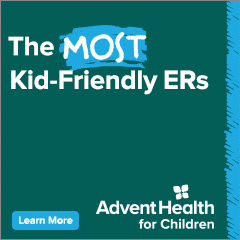Alzheimer’s: How to Talk to Your Children about It
 When a grandparent or other loved one is diagnosed with Alzheimer’s disease, it can be the children of the family who are most affected. Here’s how to address their concerns and give them a meaningful role in the support process.
When a grandparent or other loved one is diagnosed with Alzheimer’s disease, it can be the children of the family who are most affected. Here’s how to address their concerns and give them a meaningful role in the support process.
When Jill Ormachea’s father was diagnosed with Alzheimer’s disease in 2008, she had already prepared herself for the worst. After all, things hadn’t been quite right with dad for several years. He had become increasingly forgetful and confused. He repeated the same stories over and over, and Ormachea, a psychologist, recognized the signs. “From a clinical standpoint, I knew what we were facing,” recalls the Apopka resident. “But, when it’s happening to someone you love, the diagnosis is devastating.”
Because of her professional training, Ormachea was better able to understand the nature of the disease and accept the impact it would have – not only on her father, but also her mother and the rest of the family. But, she was particularly concerned about how her two young daughters, then 5 and 4, would cope.
As soon as she felt the girls were old enough to understand, she decided to be open and forthcoming about the disease and how it would change their grandfather. “They actually came to some doctor’s appointments with us when we were looking for answers,” she recalls. “I told them that Papa was okay, but that he was having some memory issues. When he was diagnosed, I told them everything about Alzheimer’s disease and what to expect.”
Ormachea bought some books on the subject and read them with her daughters, doing her best to explain exactly what was happening in their grandfather’s brain. “I was completely honest with them,” she says. “I told them that Papa could eventually die from the disease, but that we needed to enjoy the time that we had with him and be as helpful and supportive as possible.”
Today, Lauren (8 years) and Morgan (7 years), are a great source of happiness for their grandfather, who always has a smile on his face when they are around. Excited to spend time with Papa, the girls watch cartoons, sing songs and paint with him. “Seeing him so happy when he’s around the girls is comforting to all of us, especially my mother,” says Ormachea. “They understand what their grandmother is going through, so they want to help cheer her up when she’s having a bad day. In general, they have become more empathetic and have learned that others sometimes need assistance and compassion in life.”
Communication is Key
Nancy Squillacioti, executive director of the Alzheimer’s and Dementia Resource Center in Orlando, believes that Ormachea and her family are doing all the right things. Talking with the children, she says, helps create a supportive environment for the entire family. “Ask them if there’s anything about the situation that’s causing anxiety or concern,” she urges. “When you explain that grandma or grandpa has an illness and that their behavior is being altered by it, they are much less likely to make erroneous assumptions.”
Providing knowledge related to the situation is critical to helping children adjust properly, says Squillacioti. She recommends the following tips for parents:
- Be straightforward and honest. Giving your children the facts about how Alzheimer’s disease affects the brain can take some of the fear away from the awkward and troubling moments that often occur as symptoms progress.
- Anticipate emotional responses. Kids can have many different reactions to learning that a family member has Alzheimer’s disease. They might feel sad or confused – and older teens may feel embarrassed to have friends around if a grandparent acts “funny.” Some children may not volunteer their feelings at all. Parents need to anticipate these emotions — or lack thereof — and be proactive about initiating conversation.
- Support the lifelong connection. One of the most important things you can do as a parent is find a way to keep the connection alive between child and grandparent throughout the different stages of the disease. Bonding activities may include:
- Coloring or drawing pictures
- Watching a favorite TV show together
- Listening to music or singing songs
- Baking cookies
- Taking a walk around the neighborhood
- Reading a favorite book or story
“It’s important to continue creating special memories based on what those with the illness can do,” explains Squillacioti. “The more everyone understands and treats the family member with consistency, the better it is. And children can be the greatest source of comfort for those with Alzheimer’s disease because they are much less threatening than adults.”
As for Ormachea, she is grateful that her daughters have embraced the situation with such a positive attitude. She strongly recommends that parents talk to their children at every opportunity as the disease progresses, so they experience a gradual awareness of what’s happening. “Let them ask questions, and teach them so they aren’t afraid or uncomfortable,” she advises. “There’s nothing to be secretive about; it’s all part of life and death and growing old. My daughters are thankful for every moment they get to spend with their Papa because they understand how fragile life can be.”








